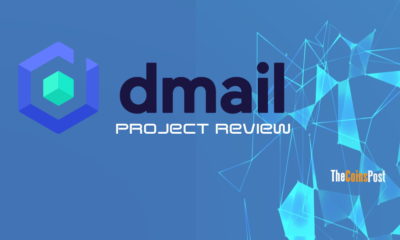Blockchain
How Cryptocurrency Is Impacting Esports

The esports sector has skyrocketed in popularity over the past five years and there are now 454 million competitive gaming fans spread across the globe. It has enjoyed a rapid rise from niche pursuit to multibillion-dollar industry and its potential for future growth is immense.
The esports scene appeals to a young, tech-savvy audience and it is bursting with dynamism, excitement and innovation. It mirrors the cryptocurrency movement in many ways and there are a number of synergies between both industries, so it is unsurprising to see them becoming increasingly intertwined.
Teenage Gamers Become Multimillionaires
For the uninitiated, esports essentially involves teenagers and young adults playing video games against one another in a bid to win prizes. The world’s leading Dota 2 players just converged upon Shanghai to contest The International 2019 and the prize money on offer was $34.3 million.
The team that won, OG, shared $15.5 million, meaning $3.1 million apiece for each of the five team members – N0tail, JerAx, ana, Ceb and Topson. The winner of the solo event this year’s Fortnite World Cup, a 16-year-old from Pennsylvania called Bugha, walked off with $3 million, so we are talking about serious money here.
The winners of Wimbledon, The Masters and the Indy 500 received less than that, showing just how far esports has come in recent years. Major companies from a wide spectrum of industries are piling in, as sponsors of big teams and tournaments include MasterCard, Intel, Coca-Cola, Audi, KFC, Samsung and many, many more.
The Consumers of the Future
They know that esports fans are the consumers of the future, and sponsoring tournaments is a great way to target them. Securing sponsorship from these huge firms is beneficial to the competitive gaming sector, as it allows players to earn more money and it makes the scene more professional, but they can sometimes feel clunky. Bud Light’s foray into esports was one such disaster.
The crypto sector has no such worries. It can be woven seamlessly into competitive gaming, and both industries can flourish alongside one another.
The reason the prize pool for The International 2019 was so high is down to the compendium model that developer Valve uses. Dota 2 players buy a “battle pass” each year and a portion of that cash is funnelled into the prize money for The International.
Revolutionising In-Game Transactions
Blockchain technology can be used to make those battle pass transactions quicker, simpler and safer. The biggest esports operate on a free to play model whereby they make money from charging players for optional in-game extras, including cosmetic upgrades and new skills. Dota 2, League of Legends, CS:GO, Fortnite, Overwatch, Hearthstone and more all use this economic model.
And it is big business. The esports industry is worth $1.1 billion in 2019, according to NewZoo, but that only factors in media rights deals, ticket sales, commercial tie-ins and merchandising. The games that are thriving because of their popularity within the esports sector make a lot more money than that.
League of Legends, for instance, made more than $3.5 billion for developer Riot Games in 2017 and 2018. Fortnite developer Epic Games makes billions each year by charging for in-game microtransactions and it is targeting esports in order to achieve longevity for the popular battle royale title.
A Decentralised Currency
Yet these in-game transactions are currently far from perfect. It is difficult to receive money from around the world, and developers like Valve have used platforms such as Steam to circumnavigate the issue. Yet it can be slow, laborious and rife with middlemen taking a cut. Cryptocurrency can negate all of that in one fell swoop.
The likes of Bitcoin, Ether, Bitcoin Cash and Litecoin are set up as decentralised digital currencies that transcend international boundaries with ease. Banks are out of the loop, so there are no middlemen taking a cut and no central governments threatening the transaction.
It is also a lot more secure for gamers and developers alike. There is no need for gamers to insert private details into web forms and hand over credit card details, which can be targeted by hackers. Crypto transactions are anonymous, peer-to-peer trades and it represents the best way for gaming companies to sell in-game extras to hundreds of millions of players around the world.
Crypto Firms Invest in Esports
A number of crypto firms are investing heavily in the space. Bitrefill, for example, is a crypto trading platform that allows gamers to purchase vouchers for online gaming services like as Steam and Blizzard’s Battle.net, with Bitcoin. GamerAll allows CS:GO players to buy skins, keys and items with a huge range of cryptocurrencies, from Bitcoin, Ripple and Bitcoin Cash to Monero, Stratis and ZCash.
Unikrn, a site dedicated to esports betting, tips and news, is another great example of an esports pioneer investing heavily in the cypto sector. Using the Ethereum blockchain, it can process up to 9,000 wagers per second, and if you check out esports betting markets here you will see just how many betting options there are.
“We have the safest wagering experience,” said Ryan Jurado, head of global content at Unikrn. “Traditional wagering does a perfectly fine job, but being able to incorporate blockchain makes everything easier for the customer, makes everything easier for us and makes everything easier for regulators. And it lets us unlock new functionality down the road.”
A Wealth of Potential
Cryptocurrency is impacting upon esports and the wider video gaming industry in a huge number of ways, and they will only become more interwoven in future in mutually beneficial ways.
Gamers have been accustomed to trading in fiat currencies for digital currencies that can be spent on in-game purchases for more than a decade, so it is an easy sell to them. The target demographic for these two sectors is very similar and it is growing with each passing year, so the potential is huge.
Blockchain
Fireblocks buys Australian blockchain start-up BlockFold

Fireblocks, the crypto company backed by Sequoia Capital and Coatue Management, has acquired BlockFold, a Melbourne-based start-up that helps financial institutions build blockchain-based systems.
As per Bloomberg , Fireblocks paid about $US10 million ($15.6 million) for BlockFold. While Fireblocks already works with large financial institutions, including Bank of New York Mellon, BNP Paribas and the Tel Aviv Stock Exchange, it has predominantly offered them services around custody technology.
New York-based Fireblocks is one of crypto’s most well-funded start-ups, having raised some $US1.2 billion so far. The company, which employs around 650 people in the US and Israel, was valued at $US8 billion in its latest financing round in January 2022.
The deal comes as large Wall Street firms ramp up efforts to issue and trade traditional financial assets like bonds and private-equity investments over blockchain networks, seeking to simplify processes and cut costs.
Founded in 2021, BlockFold specialises in tokenisation and smart-contract development for clients such as large financial institutions. Fireblocks and BlockFold have already worked together on projects including National Australia Bank’s recent cross-border stablecoin transfer.
Blockchain
Brazil Enhances National Identity Card Security with Blockchain Technology

In a significant stride toward modernization, Brazil is rolling out a novel national identity card system, fortified by the integration of a blockchain network. This innovative approach is set to bolster the security of data sharing between the Federal Revenue Service and civil identification authorities.
The cornerstone of this system is the shared registry known as b-Cadastros, designed to underpin the operations of the revenue service. This comprehensive platform facilitates searches, issuance, and modifications of the new ID cards and tax registration numbers. Notably, the platform’s development was orchestrated by Serpro, Brazil’s state-owned IT services corporation.
Serpro’s President, Alexandre Amorim, emphasized the pivotal role of the b-Cadastros blockchain platform in fortifying the National Identity Card project. “The use of the b-Cadastros blockchain platform is a major differentiator for the security and reliability of the National Identity Card project,” he stated.
The National Civil Identity Card (ICN) represents an upgraded iteration of Brazil’s traditional paper-based ID cards, and the nationwide issuance commenced in July 2022. The overarching goal of this project is to centralize the nation’s civil identification system and harness the ICN database to authenticate individuals accessing online public services.
The modern plastic card boasts an innovative feature: it empowers users to generate a single digital version of their identity document. This advancement enhances security, as it allows for validation through a printed QR code. In adopting blockchain technology for the ID cards, the Brazilian government anticipates streamlining processes and curbing fraud and illegal activities. Presently, individuals can request identification cards in all of Brazil’s 27 states, which presents challenges in terms of data integrity and security.
Serpro’s Amorim elaborated on the significance of blockchain technology in safeguarding personal data and thwarting fraudulent activities, thus delivering a more secure digital experience for Brazilian citizens.
The states of Rio de Janeiro, Goiás, and Paraná are set to pioneer the blockchain-based version of the national revenue service’s shared registry for the issuance of the new ID cards this week. The remaining states are poised to follow suit over the next six weeks, marking a significant step forward in enhancing the security and efficiency of Brazil’s identity verification and taxation systems.
Source: Forbes
Blockchain
Horizen’s $ZEN Holders Take the Helm with the DAO Launch

The Horizen community, get ready to embark on a revolutionary journey in governance as the Horizen DAO steps into the spotlight, as per Horizen’s new announcement.
Horizen, a public, open-source blockchain protocol, boasts a thriving ecosystem composed of developers, miners, node operators, and holders of $ZEN tokens across various blockchain networks. The introduction of the Horizen DAO paves the way for increased community involvement in decision-making and offers a platform for your voices to shape the project’s path.
Discovering the Horizen DAO
DAO, which stands for “Decentralized Autonomous Organization,” has emerged as the gold standard for decentralized governance in the blockchain world and beyond, as per Horizen’s new announcement.
Horizen has always been driven by its community, acknowledging the critical role of a strong social layer in upholding integrity throughout the ecosystem, as stated in Horizen’s new announcement. This ethos is guided by principles such as transparency, accountability, security, community engagement, continuous improvement, and social responsibility. Dive deeper into Horizen’s guiding principles on the Horizen governance page.
Stages of Proposals and Voting
The Horizen DAO takes decentralization of decision-making to new heights, encompassing both technical and non-technical aspects, along with other substantial system enhancements, as outlined in Horizen’s new announcement.
Protocol Improvement Proposals (IPs) are a well-established mechanism for selecting and implementing fresh features and fundamental protocol adjustments in numerous blockchain projects, as per Horizen’s new announcement. In Horizen’s case, these IPs are the cornerstone of the Horizen DAO’s community-driven governance. For Horizen’s primary chain and the EON sidechain, we respectively refer to these as ZenIPs and EONIPs, and they are the lifeblood of our governance process.
Ultimately, it’s the $ZEN token holders who wield the power to steer the future of Horizen, shaping the network’s evolution through active participation in the Horizen DAO, as per Horizen’s new announcement. Any holder of $ZEN can cast their vote on proposed improvements, while those with the requisite amount of $ZEN, either held or delegated, can propose changes to the community. To ensure effective community governance, users will also have the option to delegate their voting authority to individuals they trust as capable stewards of Horizen’s core values.
For a comprehensive understanding of the Horizen DAO, including its proposal phases, voting procedures, Constitution, and more, we invite you to explore the Horizen Governance page. Join us on this exciting journey to help mold the future of Horizen – we’re delighted to have you on board, as announced by Horizen.
-

 Altcoins5 years ago
Altcoins5 years agoProject Review: Pi Network, a New Scam Project in Town
-

 Bitcoin4 years ago
Bitcoin4 years agoBitcoin Worth $1.2M Seized From Arrested Indian Hacker
-

 Altcoins6 years ago
Altcoins6 years agoReview: Play Arcade Games Inside ARK Wallet And Win Some Free Cryptocurrency
-

 Blockchain6 years ago
Blockchain6 years agoA Full Review: Utopia A New Decentralized P2P Blockchain
-

 Bitcoin6 years ago
Bitcoin6 years agoAnother Exit Scam: NovaChain Shuts Down
-

 Exchanges5 years ago
Exchanges5 years agoCrex24 Will Require KYC Verification
-

 Bitcoin6 years ago
Bitcoin6 years agoJohn McAfee Has Gone Missing
-

 Blockchain6 years ago
Blockchain6 years agoProject Review: Dmail Decentralized Blockchain Email








